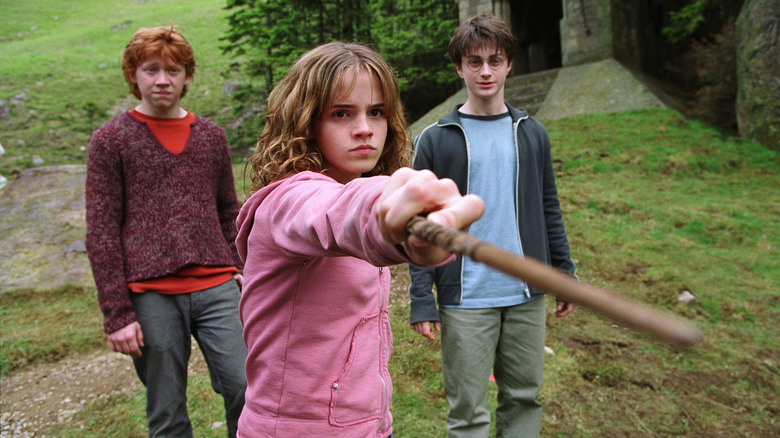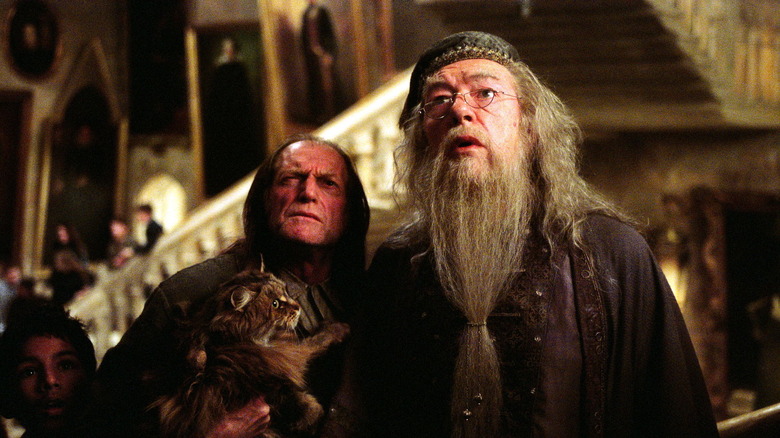Director Alfonso Cuarón Dismissed Harry Potter, Until Guillermo Del Toro Cursed Him Out
For me, the news that Alfonso Cuarón was helming "Harry Potter and the Prisoner of Azkaban" was exciting. At the time, I only knew him for directing the thoroughly enchanting and visually splendiferous 1995 film version of "A Little Princess." As for everyone else? They were trying to make heads or tails of why the guy behind the indubitably erotic 2001 Mexican road trip drama "Y tu mamá también" had been hired by Warner Bros. to work on its golden goose (which really needs to cut ties with its transphobic creator already).
Cuarón was as baffled as anyone else when WB approached him. "I was confused because it was completely not on my radar," he explained to Total Film. "A Little Princess," while critically well-received, had barely made a dent at the box office, while the director's 1998 mid-budget modern-set retelling of Charles Dickens' "Great Expectations" was an outright flop. However, this proved to be a blessing in disguise, spurring Cuarón to not only return to his roots, but to also hone his craft on "Y tu mamá también." In doing so, he developed the realist visual style he's become synonymous with, using long takes and documentary-like handheld techniques to create a film that's as boldly political as it is sexual.
When this led to the "Harry Potter" offer, Cuarón did what any artist in need of advice should do — he talked to Guillermo del Toro:
"I speak often with Guillermo [del Toro], and a couple of days after, I said, 'You know, they offered me this Harry Potter film, but it's really weird they offer me this.' He said, 'Wait, wait, wait, you said you haven't read Harry Potter?' I said, 'I don't think it's for me.' In very florid lexicon, in Spanish, he said, 'You are an arrogant a**hole.'"
Accio the perfect Harry Potter director!
Cuarón and del Toro were not only friends by the time the 2000s rolled around, they were but two of only three Mexican filmmakers who had really broken out in Hollywood. (The other one, Alejandro González Iñárritu, is also tellingly a close acquaintance of both men.) Still, there's something to the image of del Toro as this mystical entity on a mountain whom other directors consult when in need of guidance — and like any wise Yoda-esque sage, he's ready and able to give them a verbal spanking, should they require one.
Funnily enough, it was "Y tu mamá también" that had, in fact, convinced producer David Heyman that Cuarón was, as he told Total Film, "perfect" for the third "Harry Potter" movie:
"That's not what some might think. Can you imagine what some thought Harry, Ron and Hermione would get up to, having seen 'Y tu mamá también?' [...] 'Y tu mamá was about the last moments of being a teenager, and 'Azkaban' was about the first moments of being a teenager. I felt [Cuarón] could make the show feel, in a way, more contemporary. And just bring his cinematic wizardry."
Like Heyman noted, the coming-of-age and loss-of-innocence elements link "Y tu mamá también" and "Prison of Azkaban" in a way that might not be obvious at first glance. Cuarón not only infused the Wizarding World with raw teenage angst and yearning (which directors Mike Newell and David Yates would carry over into the later "Potter" films), but he also brought a blend of whimsy, pathos, and magical realism similar to that from "A Little Princess." With its darker and more mature, yet still fanciful, storyline and inspired visual flourishes, "Prison of Azkaban" might just be the best in the "Harry Potter" series.
Let that be a lesson to us all: When Guillermo del Toro calls you an "a**hole," you listen.

